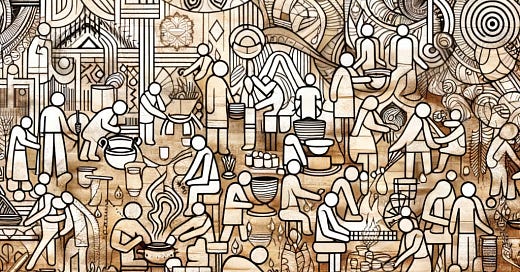Near a mangrove forest, where I have the privilege of living and learning from the vibrant communities around me, a profound understanding of resource management dances through daily life. Through my work with Grassroots Economics, I've been deeply inspired by the ancient traditions here, which showcase a deep knowledge of peering and pooling systems. As I’ve been sharing my findings to other in various feels - there seems to be a strong recognition — the concepts seem to be universally resonant across various fields of study.
Peering into Traditions and Modern Disciplines
Peering, in its essence, represents fair exchanges, where individuals or entities interact with each other (their peers) and their resources. In the realm of Economics and Resource Management, this could be seen in practices like barter systems and direct trade. Yet, in the microcosms of rural Kenya, peering finds its roots in traditions like knowledge transfer, reciprocal gifting and mutual service and aid practices, reflecting a profound connection and mutual respect among individuals.
This principle of direct exchange is not confined to economics or anthropology. In Information Technology, we observe peering through Peer-to-Peer (P2P) Networking, an embodiment of direct and decentralized communication. Similarly, Systems Theory echoes this with its emphasis on network collaborations and direct data synchronizations. Taken to an extreme peering could be seen as markets with no real purpose or surplus - this is where pooling comes in.
Pooling: Collective Wisdom across Cultures and Technologies
On the flip side, pooling represents the aggregation of resources, intentions, commitments or efforts for collective use or benefit. In traditional Kenyan communities, this is vividly alive in communal land stewardship and shared agricultural practices — a living testament to collective strength.
This concept seamlessly extends into modern disciplines. In Economics, we witness pooling in collective savings schemes and joint investment funds. In the realm of Environmental Science, community-led conservation efforts exemplify pooling by collectively managing and preserving natural resources for the greater good.
The Convergence: Blending Peering and Pooling
Interestingly, the merger of peering and pooling into combined protocols demonstrates the synthesis of individual autonomy with collective welfare. In my work with Commitment Pooling, I've seen firsthand how these systems, inspired by age-old wisdom, can drive sustainable economic models and community solidarity practices. With commitment pooling we can see how a curation of commitments can be a store of wealth (pooling) for a community and at the same time though relative value indexing - act as an exchange system (peering).
This synthesis is mirrored in Information Technology through Distributed Computing Frameworks and Smart Grids, integrating direct peer interactions with pooled resources for greater efficiency and innovation.
Reflection
As I sit here, I'm reminded that the principles of peering and pooling are not merely academic concepts but are deeply embedded in human interactions and the natural world. They resonate across disciplines — from Ecology to Computer Science — because they reflect fundamental aspects of nature and life: syntropy, connectivity and shared destiny.
In embracing these principles, we're not just applying theories but are reconnecting with ancient wisdom that has sustained communities for generations. As we move forward, whether in developing technologies, managing resources, or building communities, I want to remember the strength found in direct connections and collective actions.
By looking through the lens of peering and pooling across disciplines, I see a universal blueprint for sustainability, cooperation, and mutual respect — a reminder that, in diversity, there's unity, and in sharing, there's strength.
Here is the above table:
Subject,Peering Protocols,Pooling Protocols,Combined Protocols
Economics and Resource Management,"Direct Exchange, Barter Systems, Supply and Demand, Market Demand, Willingness to Pay","Collective Savings Schemes, Joint Investment Funds, Collective use and management of resources","Cooperative Economic Models, Commitment Pooling, Sustainable Economics, Economic Ecology, Resource Efficiency."
Social Sciences and Anthropology,"Reciprocal Gifting, Social Exchange Mechanisms, Cultural Comparison, Social Structures, Behavioral Patterns","Communal Welfare Programs, Collective Action Initiatives, Collective Norms, Shared Beliefs, Common Values","Community Solidarity Practices, Global Ethnography, Integrated Societies, Cross-Cultural Integration"
Information Technology and Computer Science,"Peer-to-Peer (P2P) Networking, File Sharing Protocols, Virtual Private Cloud Peering, Network Protocols, Data Synchronization, Mesh Networks","Cloud Computing and Storage, Resource Pools, Data Warehousing, Database Management","Distributed Computing Frameworks, Cyber-Physical Systems, Integrated Networks, Smart Grids"
Systems Theory and Network Science,"Network Collaboration Protocols, Alliance Formations, Network Protocols, Data Synchronization, Agent Interactions","Integrated Resource Management Systems, Unified Supply Chains, Resource Aggregation, Cloud Storage, Collective Intelligence","Systemic Integration Approaches, Cyber-Physical Systems, Integrated Networks, Smart Grids."
Environmental Science and Ecology,"Resource Sharing Agreements, Ecosystem Services Trading, Fungal Networks, Plant Communication, Animal Symbiosis","Community-led Environmental Conservation Pools, Sustainability and Land Trusts, Water Harvesting, Carbon Sequestration, Nutrient Cycling","Collaborative Ecosystem and Integrated Management, Ecosystem Services, Biodiversity Pools"
Psychology and Behavioral Economics,"Social Reciprocity, Trust Building, Norm Enforcement.","Group Incentives, Risk Sharing, Collective Action","Behavioral Nudges, Social Proof, Incentive Alignment, Community Engagement Strategies"
Indigenous Practices and Ancestral Wisdom,"Traditional Bartering, Mutual Service/Aid Practices, Kinship, Oral Traditions, Storytelling","Communal Resource Pools, Collective Land Stewardship, Ecological Belonging, Collective Knowledge","Integrated Community Support Systems, Integrated Wisdom, Communal Well-being, Ecosystem Stewardship"





